
|

|
Insane Clown Posse: this horror core shock rock band may be more infamous than famous, more reviled
than renowned, but they have made quite a mark on music history, and on the lives of the 1,000,000+ fans (Juggalos) who follow
their music and their message. Where some see an underworld of bizarre painted faces jumping to a twisted mesh of rock and
soda, others see one of the longest running records in Billboard Top 200 history, a full length motion picture, Big Money
Hustlas, the second highest grossing wrestling organization in the U.S., Juggalo Championship Wrestling (JCW), a career in
the WWF, WCW, and ECW, and Psychopathic Records, the self-owned record label behind it all.
Perhaps one of the boldest
and most successful moves made by Insane Clown Posse was the creation in 2000 of what has now become an annual tradition:
The Gathering of the Juggalos. This three-day convention, drawing over 10,000 attendees from the 50 states and overseas, is
a mix of concerts, games, contests, auctions, seminars, autograph signings, and everything and anything related to Insane
Clown Posse and Psychopathic Records. The Gathering has made a huge impact in every city it has come to, bringing in several
million dollars in revenue to the cities it visits. This move is unique in the music industry, and is a shining example of
Psychopathic Records' ability to both pioneer and succeed through direct, focused effort.
Insane Clown Posse is without
a doubt one of the most successful "behind-the-scenes" bands of all time. Their fame was won without massive radio play, so
it is all too easy to discount the band; however their seven certifications (two platinum, five gold) speak for themselves.
Their immense popularity lays just beneath the mainstream, yet is all the more substantial and long lasting.
The story
of how Insane Clown Posse reached this level of cult celebrity over the last ten years is as detailed as it is amazing. Later
in this booklet is a brief history of the five previous Joker's Cards albums to set the stage for the era of sixth and final
Joker's Card, beginning November 5th, 2002, when The Wraith: Shangri-La hits stores.
The
Era of the Sixth and Final Jokers Card Album
The Wraith: Shangri-LaNovember 5th, 2002, will spark the most important era in Insane Clown Posse history.
The release of the sixth and final Joker's Card album, The Wraith: Shangri- La, could not be more anticipated by fans worldwide.
Whether followers of the music and message from day one, or introduced to it during The Great Milenko era, all eyes and ears
have been waiting for this album for quite some time.
The Wraith: Shangri-La will shock the mainstream to its foundations,
going far further than anything Insane Clown Posse ever previously imagined. It is a breakthrough album that not only appeals
to Juggalos, but contains messages for the entire world as well. Supported by a highly trained mobile fleet of nationwide
promotional teams already on the move, The Wraith will be Insane Clown Posse's most successful album of all time. ICP's biggest
tour ever, set to blaze a trail across the U.S., Europe, Australia, and Japan starting early in 2003, will catapult this album
over everything that has gone before.
Psychopathic Records has weathered many storms and overcome nearly every obstacle
imaginable on its mission to promote Insane Clown Posse, and is poised to push even harder to make the sixth and final Joker's
Card album everything it was always meant and imagined to be. Insane Clown Posse themselves have made major changes in preparation
for the new era. For the first time in their careers they have changed their style of face paint. Now, instead of black and
white in fixed pattern, colors change within a black outline to match the mood, hair, and clothing of the duo. More changes
will mark this chaotic and volatile era as it unfolds.
More important than appearances, though, is the dedication and
attention to quality the sixth and final Joker's Card has received. It is an awesome record from a musical standpoint alone.
That combined with its good, positive message is The Wraith: Shangri-La's greatest selling point.
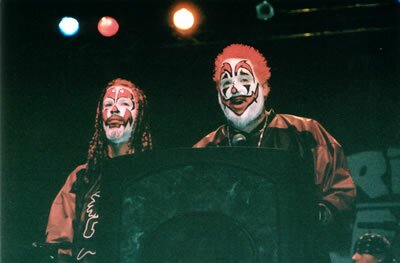
The History of the Five Previous Jokers Card albums
Before the first Joker's Card album,
Insane Clown Posse (Joseph Bruce, AKA Violent J, and Joseph Utsler, AKA Shaggy 2 Dope) were two thirds of an up and coming
southwest Detroit hard core gangster rap trio called Inner City Posse (ICP). Their 1991 self-produced release, Dog Beats,
quickly gained recognition in the world of Detroit underground music, with its funk influence and raw lyrics.
Still
heavily involved with gang activities, these were turbulent times for the group. Between explosive gang-related conflicts
and stints in county jail, ICP was looking for direction in their music. The turning point happened in 1991, when according
to band front man, Joseph Bruce, he had a surreal dream about the "Dark Carnival" and six unique messages in the form of albums.
Inspired
upon waking, Joe gave Insane Clown Posse its name, and a new and purposeful direction. Band members totally latched onto this,
quickly developing their wicked clown alter egos. They began painting their faces like clowns, in a trademark style that would
remain unchanged until 2002, with the release of the sixth and final Joker's Card album. Insane Clown Posse then immediately
started work on their first full-length album and Joker's Card, Carnival of Carnage.
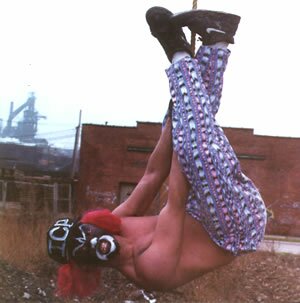
The era of the 1st Jokers Card album
Carnival of Carnage: 1992 - 1993In October of 1992, Insane Clown Posse's first LP, Carnival of Carnage, began the series
of six Joker's Card albums that took ten years to complete. Full of violently slapstick lyrics of vigilante- style revenge
against those who perpetrate evil in the world, Carnival of Carnage fully established ICP's look and musical style. With live
shows also came new innovations, namely their trademark use of Faygo soda, which the group began dousing crowds with.
Working
closely with their self-owned label, Psychopathic Records, ICP was quickly becoming a cult sensation in Detroit. Many were
receiving the message locally, but it was time to expand into the national scene.
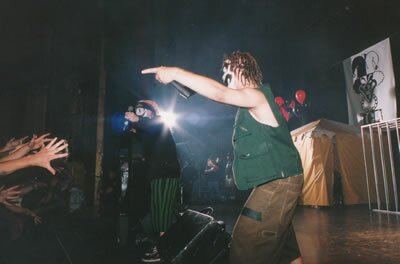
The era of the 2nd Jokers Card album
The Ringmaster: 1994 - 19951994 saw the release of the second Joker's Card album, Ringmaster. Fans were more than
ready, and record sales reflected this. Strong sales caught the attention of local Detroit music leaders, and helped establish
ICP as a group that was on the rise. By now, ICP had fully converted to professional musicians backed by a small but growing
Psychopathic Records team. The face paint, the Faygo throwing, and the hard core, carnival-inspired musical style were quickly
becoming the group's unmistakable trademark.
A local hit radio single lead to growing recognition in Detroit and throughout
the Midwest. Insane Clown Posse was entering the radar of national labels. Meanwhile, Psychopathic Records was itself growing
into an established company, branching out into peripheral ICP merchandising as well.
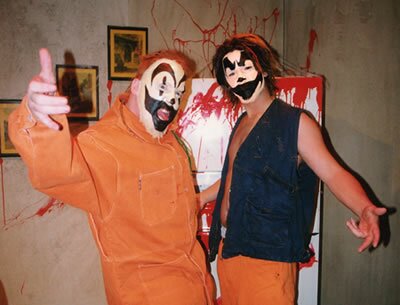
The era of the 3rd Jokers Card album
The Riddle Box: 1995 - 1996With over 100,000 records sold in the Midwest, Insane Clown Posse and Psychopathic Records
looked towards the large record labels to further promote the group and its message. They signed with New York based Jive
Records, who released The Riddle Box, the third Joker's Card album, in 1995. While Psychopathic Records promoted the album
in Detroit, Dallas, and elsewhere, Jive did relatively little. Psychopathic Records sent out street teams, covering the country
coast to coast, city by city, without the benefit of radio support. From the ground up, these teams of vans laid the foundation
of what would later become an underground nation of fans, called Juggalos.
Despite the lack of mainstream support,
this was an exciting time in the lives and careers of Insane Clown Posse and the people behind Psychopathic Records. Two videos
for a hit single were shot. ICP's cult following was growing into a nation-wide phenomenon, as the band broke ground in the
underground.
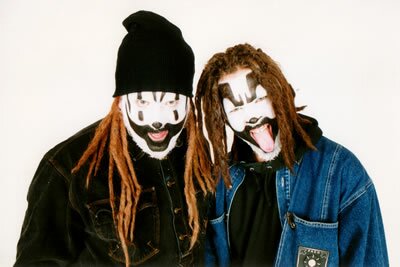
The era of the 4th Jokers Card album
The Great Milenko: 1997 - 1998As their underground popularity grew, other records labels began to take interest in
Insane Clown Posse. Moving from Jive, ICP signed a million-dollar contract with Disney's Hollywood Records to release the
fourth Joker's Card album, The Great Milenko, in 1997. In a catastrophe turned blessing, it was pulled from the shelves six
hours after dropping because of pressure from The Southern Baptist Federation.
Far from silencing ICP, this action
had the opposite effect, pole-vaulting the wicked clown duo into a media frenzy, feeding on the "bad" publicity. This sparked
a bidding war between major labels, bringing ICP and The Great Milenko (with new tracks and fully uncensored) to Polygram-owned
Island Records. The Island team had what Psychopathic Records and ICP were looking for all along: the heart and dedication
needed to truly promote their album, their musical style, and their message. The Great Milenko went on to be certified platinum,
sound scanning 1.4 million, and is currently a record holder for one of the longest running albums in Billboard Top 200 history.
The
Great Milenko's success brought Insane Clown Posse to a new level. Not only were they reaching a nation-wide audience, but
they began touring in Europe, where they met unexpected acceptance. Aside from touring, Violent J and Shaggy themselves delved
into the world of wrestling, where they joined the World Wrestling Federation (WWF), then moved to World Championship Wrestling
(WCW) as well as Extreme Championship Wrestling (ECW).

The era of the 5th Jokers Card album
The Amazing Jeckel Brothers: 1999 - 2001Riding a tidal wave of publicity and fan support, Insane Clown Posse prepared to release
their fifth Joker's Card album in June 1999. The Amazing Jeckel Brothers debuted at #4 on the Billboard Charts, just behind
The Backstreet Boys. Considering the lack of radio/MTV play and media support, this was a major achievement, and one that
did not go unnoticed in the music industry. The Amazing Jeckel Brothers was quickly certified platinum.
1999 and 2000
saw Insane Clown Posse touring throughout the county, both in larger arenas, including an appearance at Woodstock Music Festival,
and covering lesser markets at small venues. ICP also appeared on the cover of several magazines, including Alternative Press,
with that issue going on to break all AP sales records. They released a successful comic book series through Chaos! Comics.
ICP even started an independent wrestling promotion called Juggalo Championship Wrestling (JCW), which went on to become the
second highest grossing promotion in the U.S.
As the turn of the millennium approached, Insane Clown Posse's vision
only became larger and clearer. Juggling music and wrestling, ICP also advanced their film interests. They released a full-length
motion picture called Big Money Hustlas, featuring appearances by such notables as Rudy Ray Moore (Dolomite), The Jerky Boys,
Harland Williams, WWF's Mankind, Fred "Rerun" Barry, The Misfits, etc.
Insane Clown Posse and Psychopathic Records
made significant and groundbreaking expansions during this time, all setting the stage for the long-awaited sixth and final
Joker's Card album. Only with such a far-reaching and diverse foundation, could the sixth and final Joker's Card become what
it had always been envisioned and planned to be. The only ones more excited at the start of this new era than the masses of
Juggalos are Insane Clown Posse themselves and the people behind them at Psychopathic Records. Ten years of tireless dedication
is coming to a head, right now.
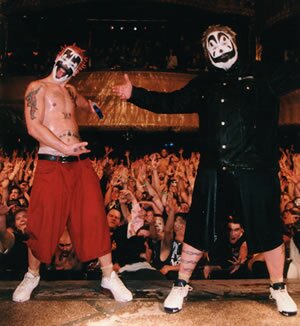
|

|

|

